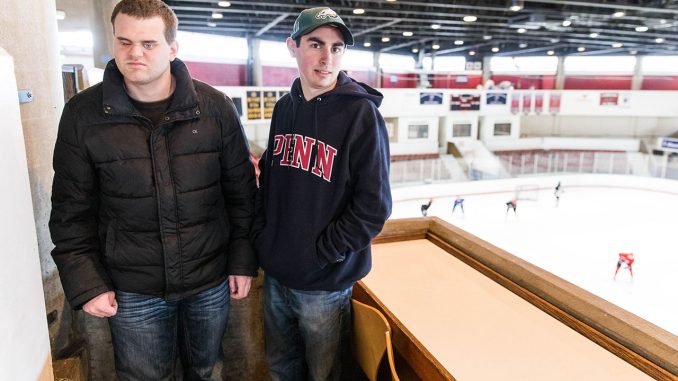
When Matt Wallace listens to a game on the radio, he doesn’t need the broadcaster to recite the score to know how the game is going.
“I always immediately pay attention to, ‘What is this broadcaster’s tone?’” said Wallace, who has been blind since birth. “And based upon this broadcaster’s tone right now, ‘Is he kind of out of the game right now? Oh, they must be losing.’”
Recently, Wallace became a broadcaster and had to convey the “ebb and flow” of a game himself. From October to February, Wallace, a 2015 journalism alumnus, provided game commentary alongside 2015 media studies and production alumnus Sam Fryman for the University of Pennsylvania club women’s ice hockey team.
The pair began working for the team as volunteers this season when Fryman returned to the Philadelphia area in search of a new broadcasting job. Wanting to keep his skills sharp while he looked for work, Fryman contacted the team to see if they wanted a pair of game commentators for the season. He asked Wallace, who was a friend at Temple, to join him.
Samantha Pulley, the team’s coach, said she agreed to have Fryman and Wallace join the team just to help their careers. But she soon realized how skilled they really were.
“It does take a while to learn the names of the athletes, their tendencies, their competition,” Pulley said. “It really speaks volumes to their character to volunteer their time and really begin to have an effect on such a wonderful program.”
Together, Fryman and Wallace were a two-man talent and production team. Seated in a small perch in the stands in Penn’s Class of 1923 Arena, Fryman would call the action while Wallace interjected with color commentary and a stream of memorized statistics.
Simultaneously, Fryman captured the action on the ice with a handheld video camera, which was later edited into game highlight reels.
Eve Phelps, a wing and junior computational biology major at Penn, also said she saw the team adopt a more serious attitude because of Fryman and Wallace.
“I remember my freshman year there wasn’t as much commitment to showing up to practices,” Phelps said. “It’s helping grow the program just by having that extra component, because it’s legitimizing it for the players.”
As a child, Wallace fell in love with sports through the voices of radio broadcasters like Tom McGinnis for the Philadelphia 76ers and Tim Saunders for the Philadelphia Flyers. Wallace said he always knew he would seek a career in broadcasting.
“I always just envisioned myself when I would have my childhood fantasies just broadcasting and living in those voices,” Wallace said. “I used to love impersonating those guys, then I realized, ‘Wait, I have my own voice that I can develop.’”
Wallace had his first broadcasting experience as a student at Monsignor Bonner High School in Drexel Hill, Pennsylvania. He gave sports reports on the morning TV show and performed live, play-by-play announcing at the football games.
“My uncle would sit next to me [and] tell me who caught the ball,” Wallace said. “I’d just broadcast it into the microphone.”
Wallace and Fryman met at Temple on the set of “We Make The Call,” a TUTV sports talk show founded in part by Wallace and Nick Gomberg, a 2015 journalism alumnus, who is also blind. George Cummings, the programming and production manager for TUTV, said Wallace and Gomberg were some of the very first students at Temple who deeply impressed him.
“From day one it was apparent to me that these guys knew their stuff,” Cummings said. “The dynamic was great and every student that ever sat on that panel with them loved them.”
Wallace acknowledges that his blindness may have sparked his interest in the non-visual aspects of sports, like statistics. But he said his talent as a sports broadcaster has nothing to do with his disability.
“I can turn on a show about science and listen to it for five hours,” Wallace said. “If you want to talk stereotypical blindness, I can listen to it ‘closer than anyone else,’ but I still won’t know what the heck they’re talking about. With sports, it just all comes to me.”
Both Fryman and Wallace are currently searching for full-time positions in broadcasting. Most recently, Fryman worked for the Fayetteville Marksmen, a Southern Professional Hockey League team in North Carolina, before it let go of its entire staff, he said.
After that setback, Fryman said his experience at Penn has proven that he has the ability to be a broadcaster.
“I honestly think after my last job, I’m like, ‘Do I still have a future in broadcasting?’” Fryman said. “Coming back and having this, it’s just a good affirmation of what I’m doing and the skill I really do have for it and that Matt has for it.”
They have already attracted attention. After reading an Inquirer story about the pair, Tim Saunders invited Wallace and Fryman to watch a Flyers game from the broadcast booth last Thursday.
“Even if we never work together again, we will never forget that Penn season together,” Wallace said.


Be the first to comment